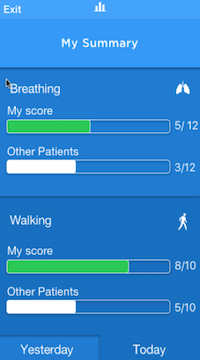Student Co-Creates App to Improve Surgery Recovery.
To lower the risk of pulmonary complications after surgery, patients at Boston Medical Center (BMC) are supposed to follow a protocol called ICOUGH, including breathing exercises and getting up and walking around.
“A lot of our patients just weren’t doing that,” says Samir Haroon, a dual MD/MPH student at the School of Public Health and the School of Medicine. So Haroon and another MED student, Andrew Chu, created a smartphone app called ICOUGH Recovery.
Haroon and Chu created the app while working on their MPHs—Chu is an MPH student at the Harvard T.H. Chan School of Public Health—and Haroon used it as his practicum experience. ICOUGH Recovery is the product both of their hands-on experiences at BMC as medical students, and learning from the public health field to “really think about health on a macro and global level instead of just a patient-to-patient level,” Haroon says.
Although patients who follow the protocol are 40 percent less likely to develop post-operative lung complications like pneumonia, “it’s a difficult protocol to sustain because it puts a lot of pressure on nurses,” Haroon says.
“Nurses are expected to constantly remind patients, ‘Now it’s time to walk, now it’s time to use your incentive spirometer’”—a device for building up lung function—“and it really puts all the pressure on them to make sure it happens, but nurses have so much to do.”
 The app, downloaded onto the patient’s smartphone, provides those reminders instead. It also provides motivation. The patient picks a friend or relative to receive updates from the app, “and then that person can get the patient to push a little harder,” Haroon says.
The app, downloaded onto the patient’s smartphone, provides those reminders instead. It also provides motivation. The patient picks a friend or relative to receive updates from the app, “and then that person can get the patient to push a little harder,” Haroon says.
The app also taps into patients’ competitive sides by awarding points for completing the exercises and other tasks, and shows the patient how they stack up against the average for the hospital’s recovery unit.
A large segment of the patient population at BMC might also have trouble with the protocol because of language barriers, Haroon says, leading to disparities in recovery. So the app is multilingual, with patients able to choose between English and Spanish and soon Haitian Creole, and Cape Verdean Creole will be added. “That covers 94 or 95 percent of this population,” Haroon says.
Haroon and Chu are working with software engineer Christopher Choi and product designer Karan Mudgal, and a group of MED student co-investigators to make the app as effective as possible. “They truly believe in the public health vision of what we’re doing,” Chu says of the team. “We have a lot of fun reimagining the hospital experience and finding ways to empower our patients.”
They are currently conducting a formal pilot study testing ICOUGH Recovery with surgery patients at BMC. Ahead of the study, patients have tried out the app informally, “interacting with a high-fidelity prototype app and giving their feedback based on the interface and the different components,” Haroon says. “It’s been very positive.”